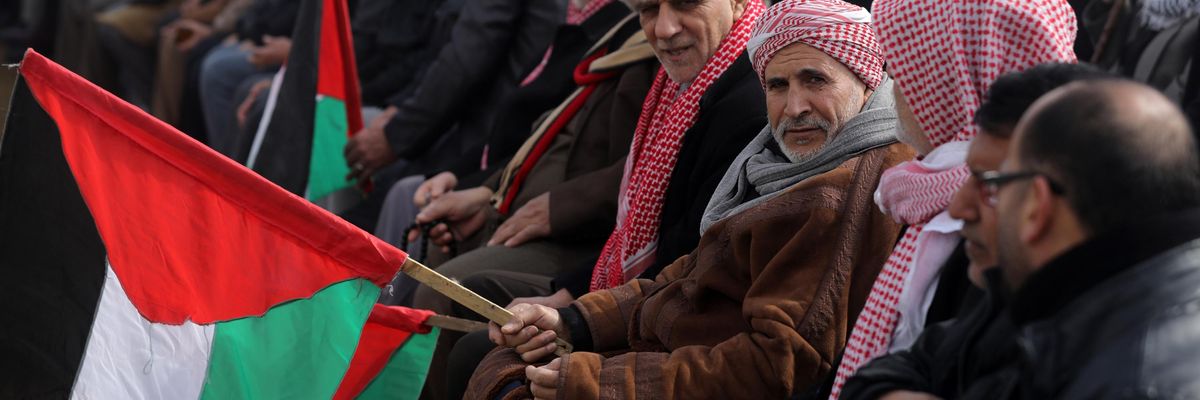The world took little notice last month when over 100 Bedouin, a third of them minors, were arrested in the Negev/Naqab desert in Southern Israel. They were protesting the Jewish National Fund's planting trees on 300 dunams as part of a 5,000 dunam (1,236 acre) afforestation project on land where 300,000 Palestinian citizens of Israel live and farm.
Following the events of 1948, the JNF planted pine trees on the ruins of the destroyed Palestinian villages to prevent the expelled Palestinians from returning.
Because the Keren Kayemeth LeIsrael-Jewish National Fund evokes images of the iconic blue box and such figures as Albert Einstein planting trees, too little attention has been placed on the role they have played, and continue to play, in Israel's dispossession of Palestinians. Take the home of the Bakri family in the flashpoint West Bank city of Hebron for example.
In 2001, during the thick of the Second Intifada, while Israeli restrictions were keeping Palestinian residents away from their homes, Jewish settlers entered the Bakri family's house near the Al Ibrahimi mosque in the center of the city. First, the settlers claimed that they had leased the house from its owners. Then, when that was rebuffed, they said that they had purchased the house from one of the Bakri family members. This was proved false and the settlers were indicted for forging that paperwork. Finally, the settlers attempted to claim that land was previously owned by a pre-1948 Jewish trust they were representing.
In 2019, having squatted illegally in the house for 18 years, Israel's court finally ordered the settlers to evacuate the property and pay the Bakri family NIS 600,000 (around $187,000 USD). However, one of the settlers argued that the ground floor of the building, where he had taken up residence, had been purchased in 2018 by the KKL-JNF, through its subsidiary Himanuta. He was granted a stay, secured by a 108,000 shekel (around $34,000) deposit paid by the KKL-JNF.
The KKL-JNF (commonly and henceforth referred to just as the JNF) was founded in 1901 at the fifth Zionist Congress to establish a national fund to purchase land for Jewish settlement in then-Ottoman ruled historic Palestine.
According to Israeli historian Ilan Pape, in 1940, Yossef Weitz, the head of the JNF settlement department, suggested a national project of meticulously compiling the topography, roads, land, and water sources and a profile of the entire Palestinian population by age, political affiliations, and hostility to the Zionist project. Known as the Village Files, these documents became a crucial tool for Jewish militias, who in 1948 burned villages, carried out massacres, and drove between 750,000 and one million Palestinians from their homes and villages, making them refugees.
Following the events of 1948, the JNF planted pine trees on the ruins of the destroyed Palestinian villages to prevent the expelled Palestinians from returning.
Following Israel's 1967 capture and occupation of the West Bank, the JNF expanded its activities.
The Sumarin family lived in their Silwan neighborhood East Jerusalem home since the 1950s until, without their knowledge, using Israel's controversial Absentees' Property Law, their property was classified as "abandoned" and JNF was appointed the property's custodian. In 1991, an eviction lawsuit was filed against them by the JNF's subsidiary Himanuta. A complex legal battle ensued until July 2020 when the court ordered all 18 members of the family to vacate their home and pay the JNF 20,000 shekels (about $5,800).
Later that year, the Israeli organization Peace Now filed a lawsuit demonstrating that the eviction case against the Sumarin family had been funded and managed by the right-wing settler Elad organization under the JNF's name. In return for financing and managing the eviction proceedings, Elad would receive the property from the JNF after the Palestinian family was removed.
Dr. James Zogby, in the Palestinians: the Invisible Victims, lays out how the JNF, from its very inception, was designed as an exclusivist organization, its charter stating that a lessee of JNF land "is asked to assure the JNF that only Jewish labor will be employed on this land." A recent report on the JNF by Maya Rosen and A Daniel Roth, reveals the deeply intertwined--as of 2007, the JNF owned 13% of the total land in Israel--and mutually beneficial relationship between the JNF and the Israeli state allowing the JNF to carry out blatant discriminatory and internationally provocative actions (such as the purchase of West Bank land) in place of the state.
Up until now, peace activists have focused their attention on halting settlement expansion in the West Bank and expulsions in East Jerusalem. It appears that is not enough. To reach the goal of a just and durable peace in Israel/Palestine, it will be imperative to dismantle the JNF, a provocative agent in the dispossession of Palestinians.

